2025年中考英语复习形容词副词课件(共64张PPT)
文档属性
| 名称 | 2025年中考英语复习形容词副词课件(共64张PPT) | 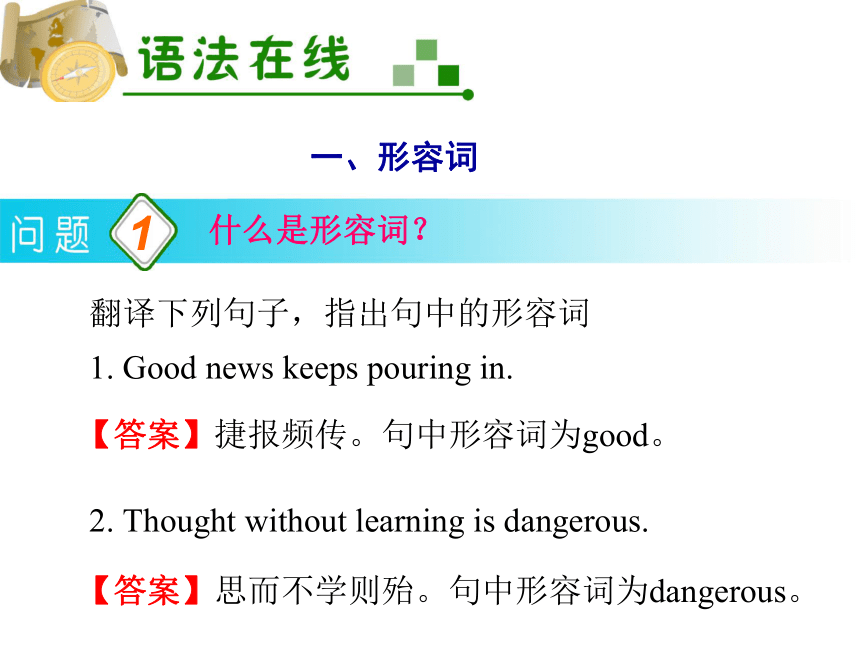 | |
| 格式 | pptx | ||
| 文件大小 | 424.0KB | ||
| 资源类型 | 教案 | ||
| 版本资源 | 外研版 | ||
| 科目 | 英语 | ||
| 更新时间 | 2024-07-20 11:33:59 | ||
图片预览


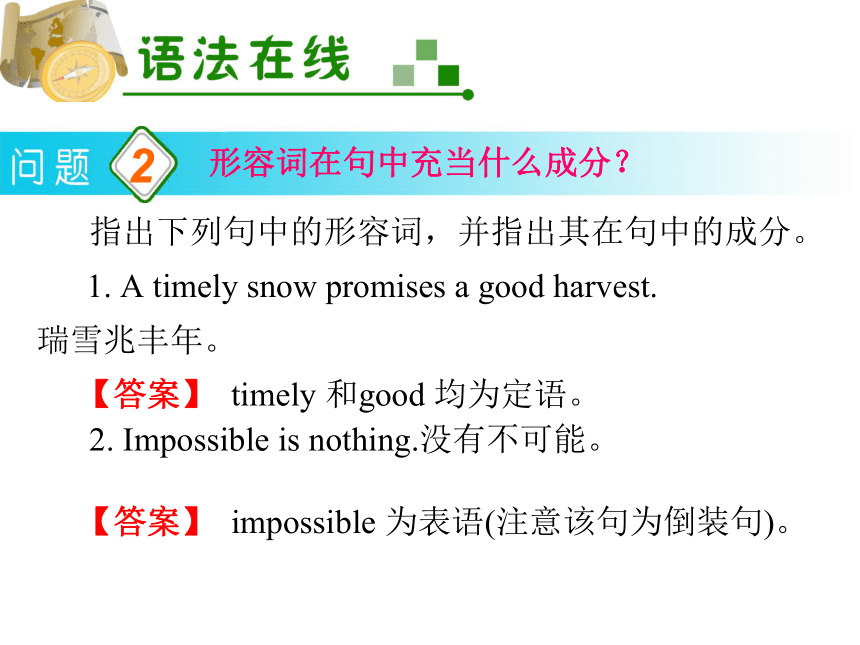

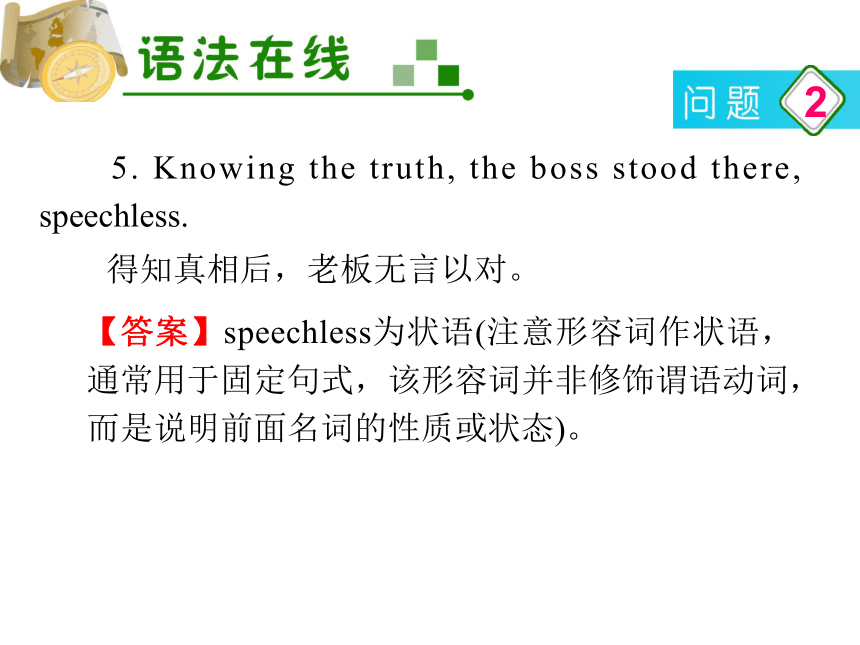
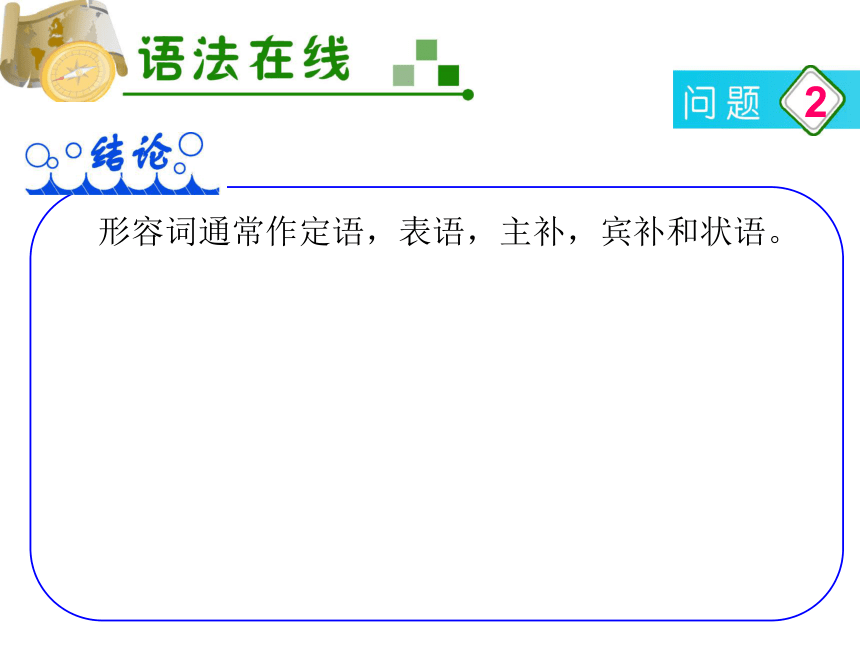
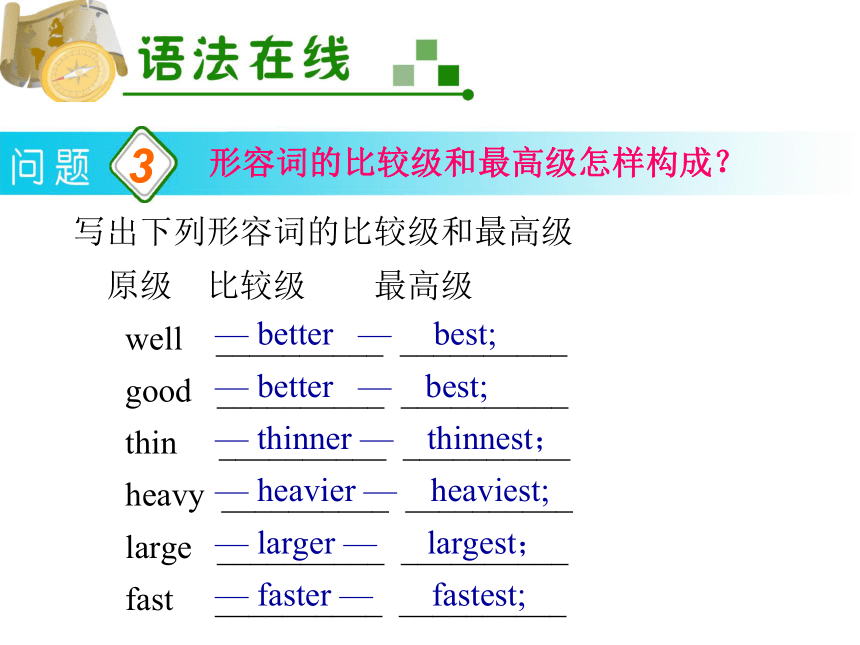
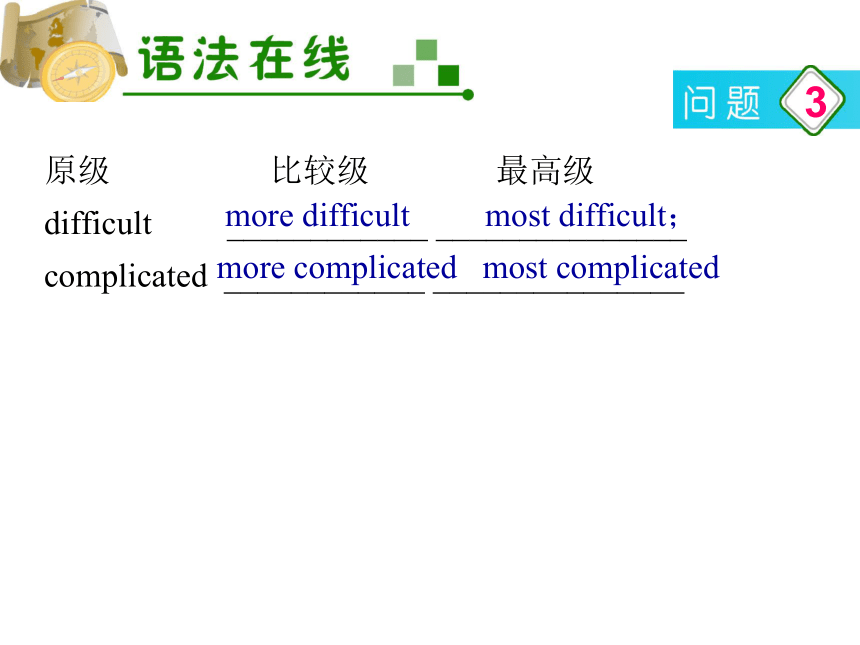
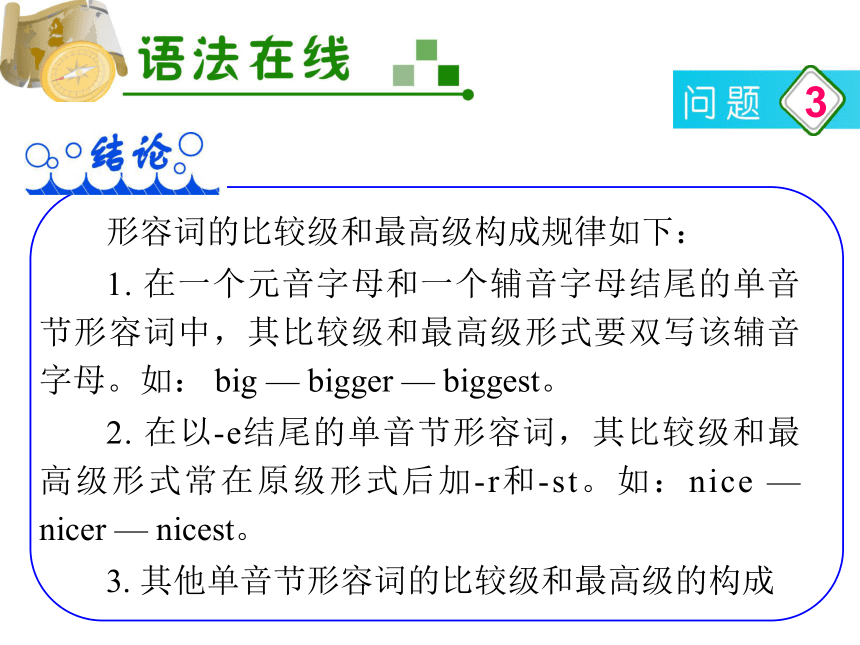
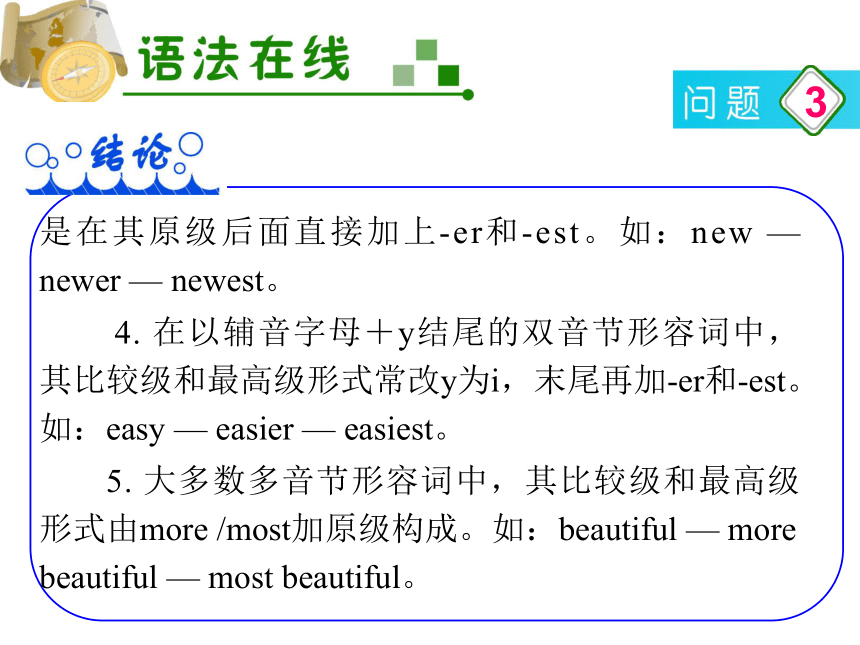
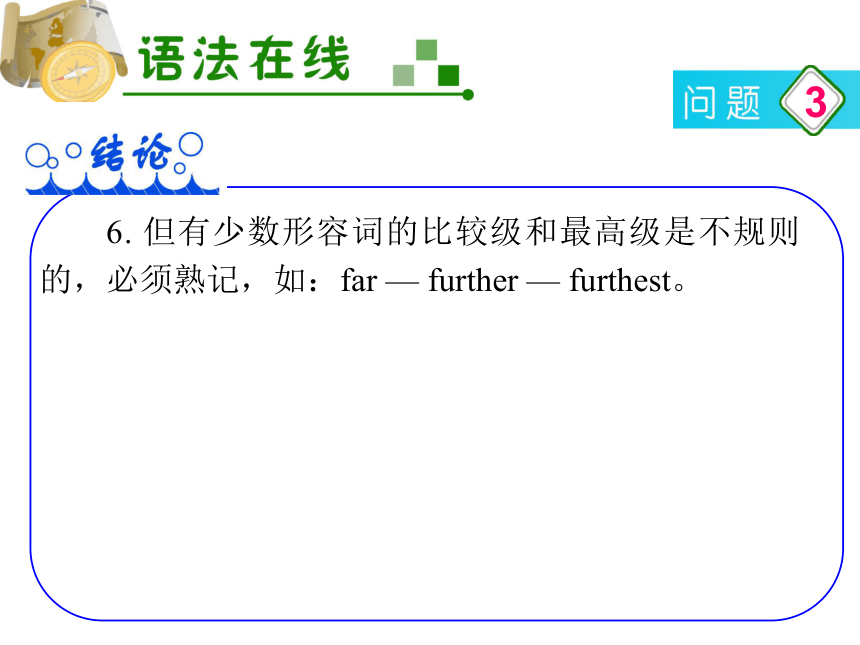
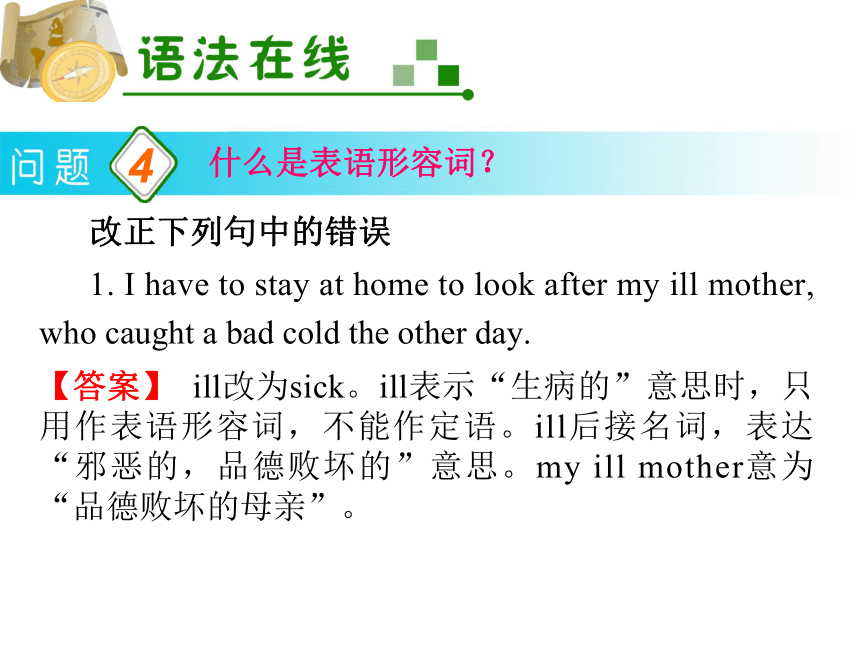
文档简介
(共64张PPT)
翻译下列句子,指出句中的形容词
1. Good news keeps pouring in.
1
什么是形容词?
【答案】捷报频传。句中形容词为good。
2. Thought without learning is dangerous.
【答案】思而不学则殆。句中形容词为dangerous。
一、形容词
1
形容词是用来修饰名词或代词,表示人或事物的性质、状态和特征的词。
指出下列句中的形容词,并指出其在句中的成分。
1. A timely snow promises a good harvest.
瑞雪兆丰年。
2
形容词在句中充当什么成分?
【答案】 timely 和good 均为定语。
2. Impossible is nothing.没有不可能。
【答案】 impossible 为表语(注意该句为倒装句)。
3. We consider the plan workable.
我们认为该计划可行。
2
【答案】workable为宾补。
4. The construction of the private house has been found illegal.
这座私家房子被发现为非法建筑。
【答案】 private为定语,illegal 为主补。
5. Knowing the truth, the boss stood there, speechless.
得知真相后,老板无言以对。
2
【答案】speechless为状语(注意形容词作状语,通常用于固定句式,该形容词并非修饰谓语动词,而是说明前面名词的性质或状态)。
2
形容词通常作定语,表语,主补,宾补和状语。
写出下列形容词的比较级和最高级
原级 比较级 最高级
well __________ __________
good __________ __________
thin __________ __________
heavy __________ __________
large __________ __________
fast __________ __________
3
形容词的比较级和最高级怎样构成?
— better — best;
— better — best;
— thinner — thinnest;
— heavier — heaviest;
— larger — largest;
— faster — fastest;
原级 比较级 最高级
difficult ____________ _______________
complicated ____________ _______________
3
more difficult most difficult;
more complicated most complicated
3
形容词的比较级和最高级构成规律如下:
1. 在一个元音字母和一个辅音字母结尾的单音节形容词中,其比较级和最高级形式要双写该辅音字母。如: big — bigger — biggest。
2. 在以 e结尾的单音节形容词,其比较级和最高级形式常在原级形式后加 r和 st。如:nice — nicer — nicest。
3. 其他单音节形容词的比较级和最高级的构成
3
是在其原级后面直接加上 er和 est。如:new — newer — newest。
4. 在以辅音字母+y结尾的双音节形容词中, 其比较级和最高级形式常改y为i,末尾再加 er和 est。如:easy — easier — easiest。
5. 大多数多音节形容词中,其比较级和最高级形式由more /most加原级构成。如:beautiful — more beautiful — most beautiful。
3
6. 但有少数形容词的比较级和最高级是不规则的,必须熟记,如:far — further — furthest。
改正下列句中的错误
1. I have to stay at home to look after my ill mother, who caught a bad cold the other day.
4
什么是表语形容词?
【答案】 ill改为sick。ill表示“生病的”意思时,只用作表语形容词,不能作定语。ill后接名词,表达“邪恶的,品德败坏的”意思。my ill mother意为“品德败坏的母亲”。
2. The number of the present students is half of the total.That's to say, half of them are absent.
4
【答案】present放students后。意为“出席的/到场的”。
4
通常只用作表语,不能作定语的形容词叫表语形容词,少数表语形容词作定语只能作后置定语。这类词以a开头的较多。如:alike,asleep, awake,afraid。
找出下列一组词中词性不同的一个单词
A. hurriedly B. repeatedly C. naturally
D. absolutely E. friendly F. obviously
5
以 ly结尾的形容词有哪些?
【答案】E
5
以 ly结尾的词不一定是副词,有可能是形容词。
以ly结尾的形容词有以下几种情况:
1.表示人际关系的名词+ ly:friendly(友好的), brotherly(兄弟般的),sisterly(姊妹般的),manly(男子汉气概的),womanly(女人般的),fatherly(慈父般的),motherly(慈母般的);
2.表示时间的名词+ ly(这些词也可用作名词,副词): daily(日常的), weekly(每周的), monthly(每
5
月的), yearly(每年的);
3.其他情况:deadly(致命的), costly(昂贵的), likely(可能的), lively(活泼的), lovely(可爱的)。
翻译下列句子
1. James is not so much a writer as a reporter.
2. James is more a writer than a reporter.
3. Is it necessary to complete the design before National Day
4. It is stupid of him to refuse the invitation.
5. This book is no more expensive than that one.
6
常见形容词句型有哪些?
6. This book is not more expensive than that one.
7. He is obviously senior /junior to me.
8. Jack is not as /so tall as Mike.
9. You could give her no greater pleasure.
10. He is too young to dress himself.
11. The citizens are too eager to know the result of this investigation.
12. As I spoke to him, he became less and less angry.
13. She plays better than (she did) last year.
14. This dress is twice as expensive as that one.
6
【点拨】
1.与其说James是作家,不如说是记者。
2.与其说James是记者,不如说是作家。
3.在国庆节前完成这一设计有必要吗?
4.他真傻,竟然拒绝了邀请。
5.这本书跟那本书都不贵。
6.这本书没有那本书贵。(隐含的意思是两本书都贵)
7.他明显比我大/小。
6
8.杰克没有迈克那么高。
9.你使她再满意不过了。
10.他还小,还不能自己穿衣服。
11.市民急于知道此次调查的结果。
12.我跟他说着话,他越来越不生气了。
13.她比去年弹得好。
14.这件连衣裙比那件连衣裙贵一倍。
6
6
1.as+形容词原级+as与not+so/as+形容词原级+as这两个句型都可以被副词quite修饰。前者表示“和……一样”,是等量比较,后者表示“不及……”,为不等量比较。两个as中间通常为表示数量、程度、性质的词,如many, much, little, few, good, tall等。
6
2.“形容词比较级+than”用于两者之间的比较,意为“比……更”。more than常有“不仅仅,超过”等意思,其反义词组有less than, worse than等。
6
3.“形容词比较级+and+形容词比较级”表示逐渐增加或减少。
6
4.“too+形容词+to do”具有否定意义,表示“太……以致不能/不会……”。注:too前面有only, all, not, but, never, simply, just, only等词,或too后有eager, happy, satisfied, apt, easy, incline (倾向于), anxious, pleased, kind, willing, ready, glad, quick等表示某种心情或描绘性的形容词时,too意为very, extremely, too…to…表示肯定意义。
6
“not/never too…to…”表达“不太……可以……/决不……能……”。“too…not to…”译为“非常……不会不……”,“…can't …too…”表达“再怎么……也不为过”。
5.“not so much A as B”和“more A than B”,两者均为部分否定,意为“与其说……,不如说……”,但二者所强调的对象不同。前者强调B,而后者强调A。
6
6.“the+形容词比较级,the+形容词比较级”表示一方程度随另一方程度的变化而变化。
7.“It is+形容词+of sb.to do sth.”和“It is+形容词+for sb.to do sth.”这两个句型使用频率都很高。前者表示说话人对客观事物的高兴、惊讶、遗憾、难过等情绪,表现的是人的性格、品质或特征。
6
8.“no more+形容词+than”和“not more+形容词+than”,前者含否定意义,表示“(两者)都不……”;后者表示程度上的差异,但有肯定意义,意为“前者不如后者”(含二者都……)。
9.“not /no /nothing /never…+形容词比较级”表示最高级含义,表示“最……不过”。
6
10.“senior to”和“junior to”分别表示“年长于”和“年幼于”,to不能换成than。类似的还有superior(优于)和inferior(劣于)。
翻译下列句子,指出画线部分单词的词性和句子成分
1. The sun rises red.
2. All men are created free_and_equal.
7
形容词作状语是怎么回事?
太阳升起红艳艳。red形容词,作状语。
人人生而自由平等。free and equal形容词,作状语。
3. The helpless mother stood there, unable to say anything.
4. I went back home, tired_and_hungry.
7
那位无助的母亲站在那儿,说不出话来。unable形容词,作状语。
我回到家里又累又饿。tired and hungry形容词,作状语。
5. Because of the harsh weather, many people in this area die young.
6. The she goat rolled over, dead.
7
因为恶劣天气,这个地区的人夭折的很多。young形容词,作状语。
那只母山羊翻了个身,死了。dead形容词,作状语。
7
形容词也可以作状语,但此时该形容词修饰的不是该句中的谓语动词,而是前面的主语。
观察下列复合形容词构成特点,将其填写在后面的横线上并写出其汉语意思
1. world famous ____________ ____________
2. peace loving ____________ ____________
3. heart broken ____________ ____________
4. middle aged ____________ ____________
5. long distance ____________ ____________
6. dark blue ____________ ____________
8
复合形容词有哪些构成方式?
名词+形容词;世界文明的
名词+现在分词;热爱和平的
名词+过去分词;伤心的
形容词+名词+ed;中年的
形容词+名词;长途的
形容词+形容词;深蓝色的
7. new born ____________ ____________
8. newly built ____________ ____________
9. hard working ____________ ____________
10. dog eared ____________ ____________
11. well known ____________ ____________
12. first class ____________ ____________
13. ten year old ____________ ____________
14. five story ____________ ____________
15. three legged ____________ ____________
8
形容词+过去分词;新出生的
副词+过去分词;新建的
副词+动词 ing;勤劳的
名词+名词+ed;卷了角的
副词+过去分词;著名的
数词+名词;头等的
数词+名词+形容词;10岁大的
数词+名词;5层楼的
数词+名词+ed; 3只腿的
16. indoor ____________ ____________
17. out of class ____________ ____________
18. would be ____________ ____________
8
介词+名词;室内的
副词+介词+名词;课外的
情态动词+动词原形;将来的
8
复合形容词有多种形式,要注意其构成。
9
多个形容词同时修饰名词时位置关系怎样?
观察句子中的修饰词,注意其类别及其出现顺序
This a pretty small round old brown Chinese wooden writing desk.
【答案】修饰词顺序及类别分别为:a(前位限定词)→ pretty(表评价性观点的形容词) →small (表大小的形容词)→round(表形状的形容词) →old(表新旧或年龄的形容词)→ brown(表颜色的形容词)→ Chinese(表产地或籍贯出处的形容词)→ wooden(表材料或质地的形容词)→ writing(表用途的形容词)desk(中心词/被修饰词)
多个形容词同时修饰名词时位置关系为:冠词,指示代词,物主代词等前位限定词 → 表评价性观点的形容词 → 表大小的形容词 → 表形状的形容词 → 表新旧或年龄的形容词 → 表颜色的形容词 → 表产地或籍贯出处的形容词 → 表材料或质地的形容词 → 表用途的形容词。
9
1
什么是副词?
二、副词
翻译下列句子,指出画线部分单词的词性
1. When the lights are on,_the city looks marvellous.
2. Though frequently beaten by his opponent, he didn't lose heart.
当灯亮时,这座城市看起来漂亮极了。on,副词。
虽常被对手打败,但他不泄气。frequently,副词。
3. He is pretty clever when it comes to repairs.
4. Obviously,_the murderer had a good knowledge of the crime situation.
6
说到修理,他在这方面非常聪明。pretty,副词。
显然,凶手对作案环境非常熟悉。obviously,副词。
1
修饰动词,表示动作发生的时间、地点、方式、程度等或表达状态的词叫副词。
2
副词有哪些种类?
翻译下列句子,指出画线副词的类别
1. What is impossible today may be possible tomorrow.
2. Going abroad to make further study is my little brother's dream.
今天不可能的事情明天可能变得可能。today, tomorrow: 时间副词。
出国深造是我弟弟的梦想。abroad:地点副词。
3. I had to shut myself at home because it rained heavily.
4. Such phenomena occasionally happen in this area.
5. You are perfectly good at playing Chinese chess while he is an expert on magic cubic.
2
因下大雨我只好闭门不出。heavily:方式副词。
这些现象偶尔发生在这个地区。occasionally:频度副词。
中国象棋你下得很好而他玩魔方很内行。perfectly:程度副词。
6. Most participants are for the plan. However,_there are some objections.
7. Put away the tools in the place where they are easy to reach.
8. When was Shakespeare born
2
大多数与会者同意这项计划。但是,还有一些反对意见。however:连接副词。
把工具放在容易拿得到的地方。where:关系副词。
莎士比亚什么时候出生的?when:疑问副词。
2
副词常见类别有:
1.时间副词:常见的有now, then, soon, ago, recently, lately, later, before, early, today, tomorrow, yesterday, tonight, suddenly, immediately, still, already, just等。
2.地点副词:常见的有here, there, up, down, away, nearby, home, ahead, abroad, indoors, overseas, upstairs, downstairs等。
2
3.方式副词:表示行为方式的副词大多以 ly结尾,如quietly, heavily, warmly, carefully, happily, politely, angrily等。
4.频度副词:常见的有always, usually, often, frequently, constantly, occasionally, sometimes, seldom, hardly, rarely, never等。
5.程度副词:常见的有fairly, pretty, rather, quite, very, much, too, greatly, almost, nearly, half, highly,
2
deeply, partly, perfectly, really等。
6. 连接副词:这类副词在语义上起连接作用,但用法上为副词,常见连接副词有therefore, besides, otherwise, however, moreover, furthermore, still, thus, meanwhile等。
7.关系副词:就是引导定语从句的when, where, why等。
2
8.疑问副词:就是用于引出特殊疑问句的when, where, why, how等。
3
副词在句中充当什么成分?
翻译下列句子,指出画线副词在句中的成分
1. It is more likely for those who work hard to achieve their goals.
2. People here tend to think hot food unhealthy.
勤奋的人实现目标的可能性更大。hard在句中作状语。
这儿的人倾向于认为辣的食物不健康。here在句中作定语。
3. Hold on, please! The manager isn't up yet.
4. Please keep your handbag outside.
5. Generally,_when heated, metals expand.
3
请稍候,经理还没起床。up在句中作表语。
提包请勿入内。outside在句中作宾补。
通常来说,金属受热膨胀。generally作插入语。
3
副词可作状语,表语,补语,定语和插入语。
4
副词在句中位于什么位置?
翻译下列句子,指出副词的位置
1. I am also fond of stamp collecting.
2. If you often feel tired after breakfast, you'd better go to see a doctor.
我也喜欢集邮。副词also放连系动词be后。
假如早餐后你经常觉得累,最好去看看医生。 频度副词often放半系动词前。
3. Who can also show me the right way of switching off the computer
4. We have also known that GOME is struggling against its trouble.
4
还有谁也能向我演示一下关电脑的正确方法?副 词also放情态动词后。
我们也知道国美正在竭力摆脱困境。 副词also放助动词后。
5. My teacher has often been faced with such an embarrassing thing.
6. It's rather difficult to tell who is right.
4
我的老师经常遇到这样尴尬的事情。 同时出现助动词be和其他助动词, 频度副词often放助动词has和助动词be中间。
很难说谁是对的。副词放形容词前。程度副词rather放被修饰词前。
7. Never have I felt so excited!
8. We can discuss questions freely in class.
9. Even a small child knows dogs like bones.
4
我从来没有觉得如此激动!否定副词放句首,句子部分倒装。
我们可以在课堂上自由地讨论问题。方式副词freely放动词(动宾结构)后。
甚至小孩都知道狗喜欢骨头。 副词even放名词前。
10. Who came here yesterday
4
昨天谁来过这里?同时出现地点,时间副词,地点副词(here)放时间副词(yesterday)前。
4
1.单个程度副词常放被修饰词前,短语副词放被修饰词后面。
2.方式副词放被修饰词后面。
3.also及频度副词的位置:放be动词,助动词(包括助动词be, has,have,had,情态动词can,must等)后;放实义动词和半系动词前;同时出现助动词be和其他助动词, 放中间。
4
4. 否定副词放句首,句子用部分倒装。
5. 同时出现地点,时间副词,地点副词放时间副词前。
5
副词的比较级和最高级怎样构成?
写出下列副词的比较级和最高级形式
原级 比较级 最高级
1. fast __________ __________
2. well __________ __________
3. early __________ __________
4. slowly __________ __________
5. Carefully __________ __________
faster fastest
better best
earlier earliest
more slowly most slowly
more carefully most carefully
5
副词的比较级,最高级构成与形容词比较级,最高级变化相似。但由单音节形容词+ly变来的副词分别在其前加more,most构成比较级,最高级,而本身含有ly的双音节副词改y为i加er或est构成比较级,最高级。
6
某些形容词变副词,词尾怎么变化?
写出下列形容词的副词形式,注意其变化规律
extreme, absolute, true, whole, comfortable, wonderful, musical,straight,wide,friendly
【答案】extremely, absolutely, truly, wholly, comfortably, wonderfully, musically,straight,wide/widely, in a friendly way
6
1.大部分以e结尾的形容词变副词直接加ly,但true, whole为特殊变化形式。
2. 以ble结尾的形容词变副词去e加y,如:possible — possibly。
3. 以ful结尾的形容词变副词直接加ly,如:harmful — harmfully。
4. 以ly结尾的形容词变副词采用in a(n)…way形
式,如:lovely — in a lovely way。
6
5. 少数单词形容词、副词同形,如:fast — fast。
6. 少数单词形容词的副词形式有两种:与形容词同形(表实际意义);在形容词后加ly(表抽象含义)deep副词形式有两种: 如:deep — deep/deeply。
翻译下列句子,指出句中的形容词
1. Good news keeps pouring in.
1
什么是形容词?
【答案】捷报频传。句中形容词为good。
2. Thought without learning is dangerous.
【答案】思而不学则殆。句中形容词为dangerous。
一、形容词
1
形容词是用来修饰名词或代词,表示人或事物的性质、状态和特征的词。
指出下列句中的形容词,并指出其在句中的成分。
1. A timely snow promises a good harvest.
瑞雪兆丰年。
2
形容词在句中充当什么成分?
【答案】 timely 和good 均为定语。
2. Impossible is nothing.没有不可能。
【答案】 impossible 为表语(注意该句为倒装句)。
3. We consider the plan workable.
我们认为该计划可行。
2
【答案】workable为宾补。
4. The construction of the private house has been found illegal.
这座私家房子被发现为非法建筑。
【答案】 private为定语,illegal 为主补。
5. Knowing the truth, the boss stood there, speechless.
得知真相后,老板无言以对。
2
【答案】speechless为状语(注意形容词作状语,通常用于固定句式,该形容词并非修饰谓语动词,而是说明前面名词的性质或状态)。
2
形容词通常作定语,表语,主补,宾补和状语。
写出下列形容词的比较级和最高级
原级 比较级 最高级
well __________ __________
good __________ __________
thin __________ __________
heavy __________ __________
large __________ __________
fast __________ __________
3
形容词的比较级和最高级怎样构成?
— better — best;
— better — best;
— thinner — thinnest;
— heavier — heaviest;
— larger — largest;
— faster — fastest;
原级 比较级 最高级
difficult ____________ _______________
complicated ____________ _______________
3
more difficult most difficult;
more complicated most complicated
3
形容词的比较级和最高级构成规律如下:
1. 在一个元音字母和一个辅音字母结尾的单音节形容词中,其比较级和最高级形式要双写该辅音字母。如: big — bigger — biggest。
2. 在以 e结尾的单音节形容词,其比较级和最高级形式常在原级形式后加 r和 st。如:nice — nicer — nicest。
3. 其他单音节形容词的比较级和最高级的构成
3
是在其原级后面直接加上 er和 est。如:new — newer — newest。
4. 在以辅音字母+y结尾的双音节形容词中, 其比较级和最高级形式常改y为i,末尾再加 er和 est。如:easy — easier — easiest。
5. 大多数多音节形容词中,其比较级和最高级形式由more /most加原级构成。如:beautiful — more beautiful — most beautiful。
3
6. 但有少数形容词的比较级和最高级是不规则的,必须熟记,如:far — further — furthest。
改正下列句中的错误
1. I have to stay at home to look after my ill mother, who caught a bad cold the other day.
4
什么是表语形容词?
【答案】 ill改为sick。ill表示“生病的”意思时,只用作表语形容词,不能作定语。ill后接名词,表达“邪恶的,品德败坏的”意思。my ill mother意为“品德败坏的母亲”。
2. The number of the present students is half of the total.That's to say, half of them are absent.
4
【答案】present放students后。意为“出席的/到场的”。
4
通常只用作表语,不能作定语的形容词叫表语形容词,少数表语形容词作定语只能作后置定语。这类词以a开头的较多。如:alike,asleep, awake,afraid。
找出下列一组词中词性不同的一个单词
A. hurriedly B. repeatedly C. naturally
D. absolutely E. friendly F. obviously
5
以 ly结尾的形容词有哪些?
【答案】E
5
以 ly结尾的词不一定是副词,有可能是形容词。
以ly结尾的形容词有以下几种情况:
1.表示人际关系的名词+ ly:friendly(友好的), brotherly(兄弟般的),sisterly(姊妹般的),manly(男子汉气概的),womanly(女人般的),fatherly(慈父般的),motherly(慈母般的);
2.表示时间的名词+ ly(这些词也可用作名词,副词): daily(日常的), weekly(每周的), monthly(每
5
月的), yearly(每年的);
3.其他情况:deadly(致命的), costly(昂贵的), likely(可能的), lively(活泼的), lovely(可爱的)。
翻译下列句子
1. James is not so much a writer as a reporter.
2. James is more a writer than a reporter.
3. Is it necessary to complete the design before National Day
4. It is stupid of him to refuse the invitation.
5. This book is no more expensive than that one.
6
常见形容词句型有哪些?
6. This book is not more expensive than that one.
7. He is obviously senior /junior to me.
8. Jack is not as /so tall as Mike.
9. You could give her no greater pleasure.
10. He is too young to dress himself.
11. The citizens are too eager to know the result of this investigation.
12. As I spoke to him, he became less and less angry.
13. She plays better than (she did) last year.
14. This dress is twice as expensive as that one.
6
【点拨】
1.与其说James是作家,不如说是记者。
2.与其说James是记者,不如说是作家。
3.在国庆节前完成这一设计有必要吗?
4.他真傻,竟然拒绝了邀请。
5.这本书跟那本书都不贵。
6.这本书没有那本书贵。(隐含的意思是两本书都贵)
7.他明显比我大/小。
6
8.杰克没有迈克那么高。
9.你使她再满意不过了。
10.他还小,还不能自己穿衣服。
11.市民急于知道此次调查的结果。
12.我跟他说着话,他越来越不生气了。
13.她比去年弹得好。
14.这件连衣裙比那件连衣裙贵一倍。
6
6
1.as+形容词原级+as与not+so/as+形容词原级+as这两个句型都可以被副词quite修饰。前者表示“和……一样”,是等量比较,后者表示“不及……”,为不等量比较。两个as中间通常为表示数量、程度、性质的词,如many, much, little, few, good, tall等。
6
2.“形容词比较级+than”用于两者之间的比较,意为“比……更”。more than常有“不仅仅,超过”等意思,其反义词组有less than, worse than等。
6
3.“形容词比较级+and+形容词比较级”表示逐渐增加或减少。
6
4.“too+形容词+to do”具有否定意义,表示“太……以致不能/不会……”。注:too前面有only, all, not, but, never, simply, just, only等词,或too后有eager, happy, satisfied, apt, easy, incline (倾向于), anxious, pleased, kind, willing, ready, glad, quick等表示某种心情或描绘性的形容词时,too意为very, extremely, too…to…表示肯定意义。
6
“not/never too…to…”表达“不太……可以……/决不……能……”。“too…not to…”译为“非常……不会不……”,“…can't …too…”表达“再怎么……也不为过”。
5.“not so much A as B”和“more A than B”,两者均为部分否定,意为“与其说……,不如说……”,但二者所强调的对象不同。前者强调B,而后者强调A。
6
6.“the+形容词比较级,the+形容词比较级”表示一方程度随另一方程度的变化而变化。
7.“It is+形容词+of sb.to do sth.”和“It is+形容词+for sb.to do sth.”这两个句型使用频率都很高。前者表示说话人对客观事物的高兴、惊讶、遗憾、难过等情绪,表现的是人的性格、品质或特征。
6
8.“no more+形容词+than”和“not more+形容词+than”,前者含否定意义,表示“(两者)都不……”;后者表示程度上的差异,但有肯定意义,意为“前者不如后者”(含二者都……)。
9.“not /no /nothing /never…+形容词比较级”表示最高级含义,表示“最……不过”。
6
10.“senior to”和“junior to”分别表示“年长于”和“年幼于”,to不能换成than。类似的还有superior(优于)和inferior(劣于)。
翻译下列句子,指出画线部分单词的词性和句子成分
1. The sun rises red.
2. All men are created free_and_equal.
7
形容词作状语是怎么回事?
太阳升起红艳艳。red形容词,作状语。
人人生而自由平等。free and equal形容词,作状语。
3. The helpless mother stood there, unable to say anything.
4. I went back home, tired_and_hungry.
7
那位无助的母亲站在那儿,说不出话来。unable形容词,作状语。
我回到家里又累又饿。tired and hungry形容词,作状语。
5. Because of the harsh weather, many people in this area die young.
6. The she goat rolled over, dead.
7
因为恶劣天气,这个地区的人夭折的很多。young形容词,作状语。
那只母山羊翻了个身,死了。dead形容词,作状语。
7
形容词也可以作状语,但此时该形容词修饰的不是该句中的谓语动词,而是前面的主语。
观察下列复合形容词构成特点,将其填写在后面的横线上并写出其汉语意思
1. world famous ____________ ____________
2. peace loving ____________ ____________
3. heart broken ____________ ____________
4. middle aged ____________ ____________
5. long distance ____________ ____________
6. dark blue ____________ ____________
8
复合形容词有哪些构成方式?
名词+形容词;世界文明的
名词+现在分词;热爱和平的
名词+过去分词;伤心的
形容词+名词+ed;中年的
形容词+名词;长途的
形容词+形容词;深蓝色的
7. new born ____________ ____________
8. newly built ____________ ____________
9. hard working ____________ ____________
10. dog eared ____________ ____________
11. well known ____________ ____________
12. first class ____________ ____________
13. ten year old ____________ ____________
14. five story ____________ ____________
15. three legged ____________ ____________
8
形容词+过去分词;新出生的
副词+过去分词;新建的
副词+动词 ing;勤劳的
名词+名词+ed;卷了角的
副词+过去分词;著名的
数词+名词;头等的
数词+名词+形容词;10岁大的
数词+名词;5层楼的
数词+名词+ed; 3只腿的
16. indoor ____________ ____________
17. out of class ____________ ____________
18. would be ____________ ____________
8
介词+名词;室内的
副词+介词+名词;课外的
情态动词+动词原形;将来的
8
复合形容词有多种形式,要注意其构成。
9
多个形容词同时修饰名词时位置关系怎样?
观察句子中的修饰词,注意其类别及其出现顺序
This a pretty small round old brown Chinese wooden writing desk.
【答案】修饰词顺序及类别分别为:a(前位限定词)→ pretty(表评价性观点的形容词) →small (表大小的形容词)→round(表形状的形容词) →old(表新旧或年龄的形容词)→ brown(表颜色的形容词)→ Chinese(表产地或籍贯出处的形容词)→ wooden(表材料或质地的形容词)→ writing(表用途的形容词)desk(中心词/被修饰词)
多个形容词同时修饰名词时位置关系为:冠词,指示代词,物主代词等前位限定词 → 表评价性观点的形容词 → 表大小的形容词 → 表形状的形容词 → 表新旧或年龄的形容词 → 表颜色的形容词 → 表产地或籍贯出处的形容词 → 表材料或质地的形容词 → 表用途的形容词。
9
1
什么是副词?
二、副词
翻译下列句子,指出画线部分单词的词性
1. When the lights are on,_the city looks marvellous.
2. Though frequently beaten by his opponent, he didn't lose heart.
当灯亮时,这座城市看起来漂亮极了。on,副词。
虽常被对手打败,但他不泄气。frequently,副词。
3. He is pretty clever when it comes to repairs.
4. Obviously,_the murderer had a good knowledge of the crime situation.
6
说到修理,他在这方面非常聪明。pretty,副词。
显然,凶手对作案环境非常熟悉。obviously,副词。
1
修饰动词,表示动作发生的时间、地点、方式、程度等或表达状态的词叫副词。
2
副词有哪些种类?
翻译下列句子,指出画线副词的类别
1. What is impossible today may be possible tomorrow.
2. Going abroad to make further study is my little brother's dream.
今天不可能的事情明天可能变得可能。today, tomorrow: 时间副词。
出国深造是我弟弟的梦想。abroad:地点副词。
3. I had to shut myself at home because it rained heavily.
4. Such phenomena occasionally happen in this area.
5. You are perfectly good at playing Chinese chess while he is an expert on magic cubic.
2
因下大雨我只好闭门不出。heavily:方式副词。
这些现象偶尔发生在这个地区。occasionally:频度副词。
中国象棋你下得很好而他玩魔方很内行。perfectly:程度副词。
6. Most participants are for the plan. However,_there are some objections.
7. Put away the tools in the place where they are easy to reach.
8. When was Shakespeare born
2
大多数与会者同意这项计划。但是,还有一些反对意见。however:连接副词。
把工具放在容易拿得到的地方。where:关系副词。
莎士比亚什么时候出生的?when:疑问副词。
2
副词常见类别有:
1.时间副词:常见的有now, then, soon, ago, recently, lately, later, before, early, today, tomorrow, yesterday, tonight, suddenly, immediately, still, already, just等。
2.地点副词:常见的有here, there, up, down, away, nearby, home, ahead, abroad, indoors, overseas, upstairs, downstairs等。
2
3.方式副词:表示行为方式的副词大多以 ly结尾,如quietly, heavily, warmly, carefully, happily, politely, angrily等。
4.频度副词:常见的有always, usually, often, frequently, constantly, occasionally, sometimes, seldom, hardly, rarely, never等。
5.程度副词:常见的有fairly, pretty, rather, quite, very, much, too, greatly, almost, nearly, half, highly,
2
deeply, partly, perfectly, really等。
6. 连接副词:这类副词在语义上起连接作用,但用法上为副词,常见连接副词有therefore, besides, otherwise, however, moreover, furthermore, still, thus, meanwhile等。
7.关系副词:就是引导定语从句的when, where, why等。
2
8.疑问副词:就是用于引出特殊疑问句的when, where, why, how等。
3
副词在句中充当什么成分?
翻译下列句子,指出画线副词在句中的成分
1. It is more likely for those who work hard to achieve their goals.
2. People here tend to think hot food unhealthy.
勤奋的人实现目标的可能性更大。hard在句中作状语。
这儿的人倾向于认为辣的食物不健康。here在句中作定语。
3. Hold on, please! The manager isn't up yet.
4. Please keep your handbag outside.
5. Generally,_when heated, metals expand.
3
请稍候,经理还没起床。up在句中作表语。
提包请勿入内。outside在句中作宾补。
通常来说,金属受热膨胀。generally作插入语。
3
副词可作状语,表语,补语,定语和插入语。
4
副词在句中位于什么位置?
翻译下列句子,指出副词的位置
1. I am also fond of stamp collecting.
2. If you often feel tired after breakfast, you'd better go to see a doctor.
我也喜欢集邮。副词also放连系动词be后。
假如早餐后你经常觉得累,最好去看看医生。 频度副词often放半系动词前。
3. Who can also show me the right way of switching off the computer
4. We have also known that GOME is struggling against its trouble.
4
还有谁也能向我演示一下关电脑的正确方法?副 词also放情态动词后。
我们也知道国美正在竭力摆脱困境。 副词also放助动词后。
5. My teacher has often been faced with such an embarrassing thing.
6. It's rather difficult to tell who is right.
4
我的老师经常遇到这样尴尬的事情。 同时出现助动词be和其他助动词, 频度副词often放助动词has和助动词be中间。
很难说谁是对的。副词放形容词前。程度副词rather放被修饰词前。
7. Never have I felt so excited!
8. We can discuss questions freely in class.
9. Even a small child knows dogs like bones.
4
我从来没有觉得如此激动!否定副词放句首,句子部分倒装。
我们可以在课堂上自由地讨论问题。方式副词freely放动词(动宾结构)后。
甚至小孩都知道狗喜欢骨头。 副词even放名词前。
10. Who came here yesterday
4
昨天谁来过这里?同时出现地点,时间副词,地点副词(here)放时间副词(yesterday)前。
4
1.单个程度副词常放被修饰词前,短语副词放被修饰词后面。
2.方式副词放被修饰词后面。
3.also及频度副词的位置:放be动词,助动词(包括助动词be, has,have,had,情态动词can,must等)后;放实义动词和半系动词前;同时出现助动词be和其他助动词, 放中间。
4
4. 否定副词放句首,句子用部分倒装。
5. 同时出现地点,时间副词,地点副词放时间副词前。
5
副词的比较级和最高级怎样构成?
写出下列副词的比较级和最高级形式
原级 比较级 最高级
1. fast __________ __________
2. well __________ __________
3. early __________ __________
4. slowly __________ __________
5. Carefully __________ __________
faster fastest
better best
earlier earliest
more slowly most slowly
more carefully most carefully
5
副词的比较级,最高级构成与形容词比较级,最高级变化相似。但由单音节形容词+ly变来的副词分别在其前加more,most构成比较级,最高级,而本身含有ly的双音节副词改y为i加er或est构成比较级,最高级。
6
某些形容词变副词,词尾怎么变化?
写出下列形容词的副词形式,注意其变化规律
extreme, absolute, true, whole, comfortable, wonderful, musical,straight,wide,friendly
【答案】extremely, absolutely, truly, wholly, comfortably, wonderfully, musically,straight,wide/widely, in a friendly way
6
1.大部分以e结尾的形容词变副词直接加ly,但true, whole为特殊变化形式。
2. 以ble结尾的形容词变副词去e加y,如:possible — possibly。
3. 以ful结尾的形容词变副词直接加ly,如:harmful — harmfully。
4. 以ly结尾的形容词变副词采用in a(n)…way形
式,如:lovely — in a lovely way。
6
5. 少数单词形容词、副词同形,如:fast — fast。
6. 少数单词形容词的副词形式有两种:与形容词同形(表实际意义);在形容词后加ly(表抽象含义)deep副词形式有两种: 如:deep — deep/deeply。
同课章节目录
- 词法
- 名词
- 动词和动词短语
- 动词语态
- 动词时态
- 助动词和情态动词
- 非谓语动词
- 冠词
- 代词
- 数词和量词
- 形容词副词及其比较等级
- 介词和介词短语
- 连词和感叹词
- 构词法
- 相似、相近词比较
- 句法
- 陈述句
- 一般疑问句和否定疑问句
- 特殊疑问句及选择疑问句
- 反意疑问句
- 存在句(There be句型)
- 宾语从句
- 定语从句
- 状语从句
- 主谓一致问题
- 简单句
- 并列句
- 复合句
- 主谓一致
- 主、表语从句
- 名词性从句
- 直接引语和间接引语
- 虚拟语气
- 感叹句
- 强调句
- 倒装句
- 祈使句
- 句子的成分
- 句子的分类
- 题型专区
- 单项选择部分
- 易错题
- 完形填空
- 阅读理解
- 词汇练习
- 听说训练
- 句型转换
- 补全对话
- 短文改错
- 翻译
- 书面表达
- 任务型阅读
- 语法填空
- 其他资料
